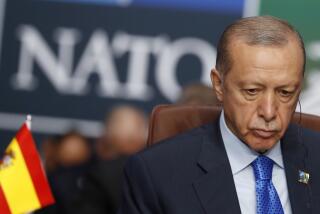Britain’s David Cameron defends opt-out from new EU treaty
- Share via
Reporting from London — Prime Minister David Cameron insisted Monday that Britain would remain a full member of the European Union, despite his decision last week to opt out of an agreement by all 26 other EU nations to sign or consider joining a new treaty to harmonize their fiscal policies.
In a raucous session of the House of Commons, Cameron denied that Britain would find itself more cut off from Europe, a state of affairs many of his anti-EU colleagues in the Conservative Party would actually welcome. He also dismissed suggestions of a major crack in his coalition government, even though his own No. 2, Deputy Prime Minister Nick Clegg of the Liberal Democrats, has condemned Cameron’s decision.
“We are in the European Union and we want to be,” Cameron said to heckling and loud guffaws from the opposition Labor Party. “I am absolutely clear that it is possible to be both a full, committed and influential member of the European Union but to stay out of arrangements where they do not protect our interests.”
Those interests, he contended, would have been in jeopardy had he agreed to the new pact, because it won’t contain provisions Cameron demanded to exempt Britain’s giant financial services sector from European regulation. More than 10% of the British government’s tax revenue flows from London’s status as Europe’s banking hub, and Cameron wants to keep regulation light.
But the potential price is increasing isolation within the EU and a loss of voice in important economic decisions. The nations belonging to the new treaty, expected to include all 17 that use the euro as well as six to nine others, will have little incentive to take Britain’s opinions into account, critics say.
The pact, agreed upon Friday, is part of Europe’s attempt to draw a bead on the debt crisis threatening the survival of the euro. The aim of the treaty, crafted by EU heavyweights Germany and France, is to impose tighter controls on the spending and borrowing of participating nations to avoid future debt problems.
The treaty does nothing to address the current crisis, however. Many analysts and investors have been counting on the agreement to persuade the European Central Bank to step in and protect heavily indebted countries such as Italy and Spain by buying up their bonds, but there is no sign yet that the bank has any plans to do so.
European equity markets fell heavily Monday, following the now well-worn pattern in which stocks make major gains after leaders announce a new solution to the debt crisis, and then dive the next trading day as investors begin to pick apart the details.
Here in Britain, attention was focused on what lies in store for the country after Cameron’s decision to stay out of the new treaty.
“Euroskeptic” members of the Conservative Party could scarcely contain their glee, and gave Cameron a rousing reception at a dinner he hosted Friday night at the prime minister’s country estate, Chequers. Some Tories hope that the opt-out will herald a complete recalibration of Britain’s relationship with the rest of Europe — possibly even a withdrawal from the EU altogether, though Cameron rejected that idea Monday.
The Conservative crowing brought a sharp rebuke from Clegg, the deputy prime minister, whose Liberal Democrats are the most Europhile of the three major parties. Although he initially appeared to support Cameron’s performance at the EU summit in Brussels, Clegg came out harshly against his coalition partner over the weekend and warned that Britain faced a worrisome erosion of influence.
Clegg, who normally sits next to Cameron on the government’s front bench in Parliament, was conspicuously absent Monday during the prime minister’s robust defense of what happened last week.
“It would’ve been a distraction if I was there,” Clegg told Sky News. “The prime minister and I clearly do not agree on the outcome of the summit.... Isolation in Europe, when we are one against 26, is potentially a bad thing for jobs, a bad thing for growth and a bad thing for the livelihood of millions of people in this country.”
But he and Cameron insisted that their political marriage remained intact. Neither party can afford a messy divorce right now, which would most likely lead to elections that could bring grim results from voters increasingly angry over the coalition’s sweeping austerity cuts.
On the continent, French President Nicolas Sarkozy hailed the treaty as the birth of a new reality.
“There are now clearly two Europes: one that wants more solidarity between members and regulation, the other that is interested only in the idea of the single market,” he told the newspaper Le Monde, in a dig at Britain.
Other European officials expressed regret that Euroskeptic views in Britain now prevailed.
“I regret very much that the United Kingdom was not willing to join the new fiscal compact,” the EU’s top economic official, Olli Rehn, told reporters in Brussels. “I regret it as much for the sake of Europe and its crisis response as for the sake of British citizens and their perspectives. We want a strong and constructive Britain in Europe, and we want Britain to be at the center of Europe, not on the sidelines.”
More to Read
Sign up for Essential California
The most important California stories and recommendations in your inbox every morning.
You may occasionally receive promotional content from the Los Angeles Times.











